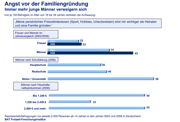Current research, 194
2 November 2006
Fear of starting a family. More and more young men are refusing
Germany has only half as many children as it did forty years ago. On the other hand, the importance of the family in recent years has never been as high as it is today, which is why social research is predicting a „renaissance of the family“. More and more young people are attaching importance to the family, but by this they mean less their own family and more the family of origin and parents („Hotel Mum“). Young men in particular want to know less and less about starting a family because their personal leisure interests are more important to them (2003: 34% - 2006: 43%). This is the result of a recent representative survey by the BAT Leisure Research Institute, in which 2,000 people aged 14 and over were asked about their life plans.
„Many young men have not yet found their personal life concept in the 21st century,“ says Prof Dr Horst W. Opaschowski, Scientific Director of the Institute. „They have largely lost their role as head of the family. And they are less and less needed as the main breadwinner. In contrast, more and more women are successfully ‚standing their ground’ - both professionally and privately. As a result, young men are withdrawing into their own world of interests and exercising their right to refuse to procreate.“ Four out of ten young men aged 18 to 39 are of the opinion: „My personal leisure interests (sport, hobbies, holidays) are more important to me than getting married and starting a family.“ The proportion of men refusing to start a family has increased significantly in the last three years from 34 to 43 per cent and is now almost twice as high as among young women (2003: 22% - 2006: 23%). The demographic consequences are not long in coming: one third of the population remains childless for life.
Dare to have more family? Fear of responsibility
The 7th Family Report (2006) of the Federal Ministry for Family Affairs appeals to the young generation: „Dare to have more families!“ In fact, many young people today see starting a family as a risk - just as „emigrating with the family“ used to be a life risk. In uncertain times, when there are no longer any guarantees of training and employment, it is becoming increasingly difficult to encourage the younger generation to plan for their future in the long term and decide to have children again.
„In the current discussion about the emancipation of women and their double burden, the role of men is given far too little attention,“ says Professor Opaschowski. „Obviously, many young men lack the courage to look after children throughout their lives and take on family responsibility. Many are not yet ready or don't feel ready.“ And the higher the level of education, the greater the fear of taking on responsibility. A clear majority of young men with a grammar school degree (56% - women: 34%) refuse to start a family, which also explains the high rate of childlessness among academics.
Having to restrict yourself?
Fear of loss of prosperity
There is also fear of poverty or fear of a loss of prosperity among young men, but predominantly only among lower earners (less than €1,250 net monthly income: 54%) and higher earners (over €2,500: 53%). Opaschowski: „The greatest satisfaction is found in the centre, where there is neither hardship nor abundance.“
Behind the young men's attitude of refusal is also the fear of not being able to maintain the standard of living they have once acquired and earned. After all, the feared loss of prosperity is also associated with a loss of face - towards friends, neighbours and colleagues.
Growing up in times of prosperity, young men in particular have difficulties adjusting and are therefore less willing to restrict their personal freedoms. There is a great fear of having to give themselves up. As a result, their conflict of interest is becoming ever greater: the desire for a family is growing to the same extent that the desire to have children of their own is decreasing. Opaschowski: „The compatibility of family and career, which in the public debate has so far been seen as the main obstacle to realising the desire to have children, must be expanded to include the question of prosperity: How much sacrifice in consumption does the desire to have children entail? After all, experience speaks for itself: a condominium is already said to be as expensive as two children. Both account for just under a third of net income.“
Effective public relations work in family policy and „encouragement“ and „leading by example“ in raising a family are necessary. Only then can starting a family be perceived as a task worth living for, without personal interests being neglected. In the fast-moving times of the 21st century, „mother's happiness“ and „father's joy“ probably need to be redefined: They bring a consistency factor to life.
And the economy also has a role to play. If it really has a serious interest in ensuring more „family-conscious working structures“ in future, then it must not stop at „father awareness“. This starts with the two „partner months“ for parental allowance and ends with part-time work or temporary job sharing. This is the only way to give men the chance to acquire a dual competence like women and to be able to answer the two questions of life's future in a positive way: „How successful are you at work?“ And: „How much time do you make for children and family?“ This doubly competent „new man“ is still a minority for the time being. But innovations are always heralded by minorities.



